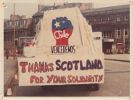Eye For Film >> Movies >> Nae Pasaran (2018) Film Review
Nae Pasaran
Reviewed by: Amber Wilkinson

When Felipe Bustos Sierra was a child, the son of a Chilean journalist in exile in Belgium, he heard stories of a group of Scottish Rolls-Royce workers, who, in 1974, had refused to work on engines used in the Pinochet regime's Hawker Hunter jets. It was an act of solidarity with the people of a country brought low by a military coup that used the planes to bomb the seat of government and kill the democratically elected president Salvador Allende. In 2013, Sierra, now a documentarian, went on the trail of the engines and the trade unionists for a short film, which has now been expanded into this emotionally resonant feature.
The journey to this point for Sierra speaks of the passion project that it is - and the film benefits hugely from his engagement with the emotional aspects of the story. He is interested in what drove engine inspector Bob Fulton and his colleagues to 'black' the engines in the first place - essentially marking them as not to be worked on - but also in showing us and them the genuine impact that their actions in a corner of East Kilbride in Scotland had on the other side of the world.

Sierra uses archive footage to set the historical scene before Fulton and his friends including Stuart Barrie, Robert Somerville and John Keenan, reminisce in the pub about their decision to launch the boycott. The men are a likeable crew, with a strong and enduring belief in solidarity, that may well have you mourning the loss of unions from many workplaces.
In South America, Sierra sets about interviewing Chileans about the coup - many of whom were imprisoned and tortured by Pinochet. He shows this footage to the men back in Scotland, capturing their reactions and, in doing so, creates a heartfelt dialogue between decades and continents. Sierra also goes on the trail of the engines themselves - left outside to rot in East Kilbride but spirited away one night years later. Their story remains muddy, largely due to the government documents cloaked in secrecy, and although I didn't see the version of the film that played at Glasgow Film Festival earlier this year, I suspect the last ten minutes or so, detailing the fate of the engines, may have been added since to bulk out the running time, as they don't quite sit neatly with the rest of the film.
These rough edges matter little, as the crux of this story is the emotional connection, then and now, felt by the Scots and the Chileans. As honours come their way, their self-effacing reaction to sudden notoriety makes it all the more touching. In a world increasingly divided by political extremism, it's nice to be reminded of the quiet power of solidarity and standing together, no matter what the physical distance between people may be.
Reviewed on: 02 Nov 2018

















